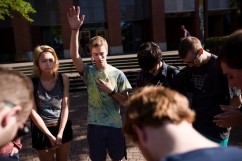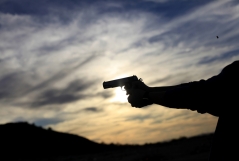A new survey showed that almost one in three US adults owns at least one gun. Those owning guns, according to the survey, are predominantly white married men over 55 years old.
Researchers said gun ownership is closely tied to "social gun culture," wherein family and friends also own guns and think less of those who do not own guns, according to Reuters.
Lead author Dr. Bindu Kalesan of the Mailman School of Public Health at Columbia University in New York said about 310 million guns are estimated to be in the possession of residents in the US, which has a population of 318.9 million people based on 2014 data.
The study used data from a 2013 online survey of 4,000 people over age 18 from all 50 states and the District of Columbia. Participants were selected to be representative of the US population as a whole.
Results of the study were published in the journal Injury Prevention.
Almost one in three or 29.1 percent of the respondents said they owned at least one gun. Among those who said that they did not own a gun, only 6.1 percent said they were exposed to social gun culture, while the prevalence of gun ownership was 32.3 percent among those who were exposed to this.
The study said the rates of gun ownership and gun deaths were higher in states with weak gun control policies.
Gun ownership in the US varied from the lowest in Delaware at 5.2 percent to the highest in Alaska at 61.7 percent.
In the northeast of the US, Vermont had the highest rate of gun ownership at 28.8 percent while North Dakota topped in the Midwest with 47.9 percent and Arkansas in the south with 57.9 percent.
The study said gun death rates in the US remained high with 33,636 people killed and 84,258 injured in gun violence in 2013.
"The link between social gun culture and gun ownership also suggests one avenue through which modern conceptions of the primacy of gun ownership, despite the potential public health consequences, are reinforced," according to the researchers.
They added: "Although notions of protection of one's family and property originally justified gun ownership, [this] is today sustained in public consciousness much more through calls to constitutionally enshrined social values, reinforced intermittently by outrage at efforts to limit widespread gun availability."
The results suggested that the prevailing social gun culture in the US should be considered in the planning and implementation of prudent gun policies designed to reduce the harms associated with gun ownership.
Gun ownership is on a decline in the US in general although sales have increased, suggesting that those who do own guns may be buying more than one, Kalesan said.
She said policy makers should keep in mind the pervasive gun culture and the strong association with gun ownership.
Kalesan said that universal background checks for purchasing guns and ammunition tend to be the most effective laws in discouraging gun ownership.
















